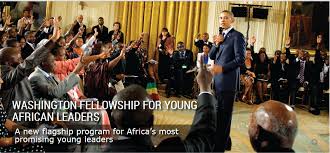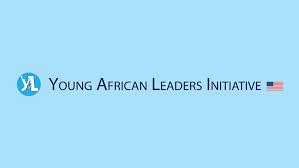On the 29th of June 2013, President Barack Obama in front of an audience of more than 600 dynamic young leaders from South Africa, Kenya, Nigeria, and Uganda, announced the Washington Fellowship for Young African Leaders, the new flagship program of the President’s Young African Leaders Initiative (YALI). Beginning in 2014, the program will bring more than 500 young African leaders to the United States each year for leadership training and mentoring. It will also create unique opportunities in Africa for Fellows to use their new skills to propel economic growth and prosperity, and strengthen democratic institutions.
The Washington Fellowship will:
- Invest in a new generation of young African leaders who are shaping the continent’s future.
- Respond to the strong demand by young African leaders for practical skills that can help them take their work to the next level in the fields of public service and business.
- Deepen partnerships and connections between the United States and Africa.
- Build a prestigious network of young African leaders who are at the forefront of change and innovation in their respective sectors.
Washington Fellows will primarily be between 25 and 35 years old, have a proven track record of leadership in a public, private, or civic organization, and demonstrate a strong commitment to contributing their skills and talents to building and serving their communities.
Welcoming Promising Leaders to the United States
Beginning in 2014, each year the United States will bring 500 of Africa’s most promising young leaders to U.S. universities for training in public management and administration; business and entrepreneurship; and civic leadership. Training in each of these sectors will focus on the skills young African leaders need to run better ministries, start and grow businesses, and serve their communities. Within the next five years, theinitiative aims to grow to 1000 young leaders each year.
Washington Fellows will spend six weeks at top American universities and colleges that will provide tailored training in the sectors above, leveraging top faculty, cutting-edge curricula, and local opportunities to impart practical professional and leadership training. Formal university training will be augmented by workshops, mentoring, and networking opportunities with leaders in each field, as well as internships across the United States.
For example, U.S. agencies such as the Overseas Private Investment Corporation and the Export-Import Bank will host Washington Fellows as interns to expose them to the U.S. workplace and practices, and build their technical skills. Washington Fellows will also benefit from partnerships with American companies like Boeing, which will provide leadership training at the Boeing Leadership Center in St. Louis to extend Fellows’ campus-based training. The Fellows will also have the chance to interact with President Obama during an annual Summit in Washington, D.C., along with other senior U.S. government, business, and civic leaders.
Investing in Opportunities on the Continent
The U.S.-based training Washington Fellows will receive is only the beginning of the long term investment the United States will make in these young leaders. To ensure that participants can put their newly-acquired skills and experiences to use, the U.S. Government is working with businesses, governments, and institutions to create meaningful opportunities to allow them to put their skills to practice in Africa.
The Washington Fellowship will offer participants valuable access to internships and job opportunities in the private and public sectors. We are establishing partnerships with companies, government ministries, research institutions, regional organizations, and non-profit and community-based organizations across the region to provide meaningful career opportunities for these young leaders. For example, Microsoft will connect Washington Fellows with internships in their offices across Africa, including in Cairo, Tunis, Casablanca, Abidjan, Dakar, Accra, Lagos, Abuja, Luanda, Johannesburg, and Nairobi. Ethiopian Airlines will offer participants the opportunity to train at their business management and corporate governance platforms at its hubs around the world.
Washington Fellows will have access to dedicated funding opportunities to support their ideas, businesses, and organizations. More than $5 million in small grants will be awarded in the first three years by the U.S. African Development Foundation to Washington Fellows seeking to start their own businesses or social enterprises. The U.S. Department of State will invest an additional $5 million over the course of the program to help alumni establish or grow non-governmental organizations, undertake a project to improve their community, or work collaboratively to build the network of young African leaders, including reaching into underserved areas. USAID will establish regional hubs and coordinators to connect Washington Fellows to these opportunities and leverage over $200 million in ongoing youth programs and initiatives on the continent.
Sustaining a Strong Alumni Network
Washington Fellows will be a part of a vibrant network that will continue to connect them to new opportunities in Africa and to each other. Regular local and regional events and networking opportunities will sustain strong ties over the years as program participants assume leadership positions in their respective sectors. Participants will be required to mentor other promising young leaders, enhancing the impact and sustainability of the initiative, and growing the network to encompass other leaders, especially in disadvantaged communities.
APPLICATIONS WILL BE ACCEPTED STARTING LATE 2013
CRITERIA FOR APPLICANTS:
- Be a citizen of and reside in a sub-Saharan African country. Persons holding U.S. citizenship or permanent residency are ineligible.
- Speak and write proficiently in English.
- Be between 25-35 years of age at the time of application submission, although exceptional candidates younger than 25 will be considered.
- Have a proven record of leadership and accomplishment in public service, business or entrepreneurship, or civic engagement.
- Demonstrate a commitment to public or community service, volunteerism, or mentorship.
- Be committed to return to Africa and contribute their skills and talents to build and serve their communities.
For More Information:
Visit the Young African Leaders Initiative Webpage
Source: White House Press Office


